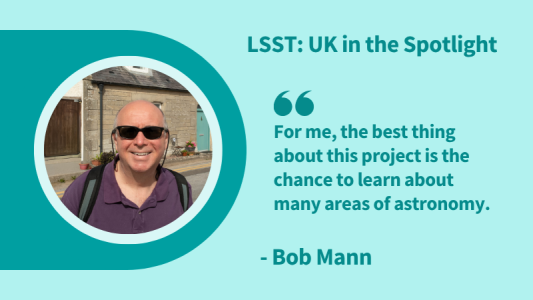In the Spotlight: Bob Mann
Published 17 October 2025

Prof Bob Mann is the Project Leader for LSST:UK
Based at the University of Edinburgh, Professor Bob Mann is the Project Leader for LSST:UK. In his role he helps to coordinate the UK involvement in the Rubin LSST.
He is also the Work Package leader for the development and future operation of the UK's Independent Data Access Centre, which will serve LSST data to astronomers and support their science.
What excites you most about the Rubin LSST?
The range of science that be done with Rubin LSST data; it really will yield great advances in almost all areas of astronomy.
What inspires you to do the work you do?
I believe in science as a collective endeavour, undertaken by a wide range of people distributed both geographically and across time. Being a part of that seems like a worthwhile way to earn one's living.
What’s the most challenging thing about working on LSST:UK?
There is so much going on in different parts of the project - both in the UK and internationally - and I find it difficult knowing that I can't keep up with all the aspects that interest me.
What's the best thing you've learned while working on LSST:UK?
The best thing for me - and this will only get better once survey is fully operational – is getting to learn about many different areas of astronomy that I was woefully ignorant of before. Our education and standard career progression turns us into specialists, and I've found it very refreshing to hear about new science areas.
How did you get into astronomy?
I was bored one afternoon in the summer holidays when I was about 8 or 9. I went into my brother's room to find a book to read and discovered that he had The Observer's Book of Astronomy by Patrick Moore. Reading that, I was astonished to discover that even a fairly modest telescope could take a spectrum of a star trillions of miles away that could reveal its physical properties and chemical composition. That really blew my mind and I wanted to be an astronomer from then.
What's your favourite thing about being a scientist?
Learning new things and seeing the field advance; attending seminars now, I hear things that I would not have dreamt were possible when I was a PhD student thirty years ago.
What do you enjoy doing when you’re not working on LSST:UK?
While my work on LSST:UK is the biggest single part of my job, I enjoy the other aspects – the teaching, and even some of the admin – involved in being an academic; it is quite a varied job, and I like that. Outside work, I am starting to get properly interested in photography. I have always taken snaps of places I've visited, but am starting to think more seriously about the process of creating interesting images.
Tell us something your colleagues don't know about you.
I have always wanted to write fiction. I have various ideas going around in my head, but I have never made the time to sit down and actually write something.
If you weren't a scientist, what would your dream job be?
If I had any artistic skill, I would have loved to have been an architect. It seems the ideal mixture of artistic and technical activities. That said, I know that many architects design nothing more glamorous than loft conversions, so maybe it wouldn't have been so good.
Is there a book you'd recommend to anyone interested in astronomy?
Carl Sagan's book accompanying his Cosmos TV series may be a little dated now, but there is something about his passion for science as a human endeavour that I'm sure would still inspire readers today.
What's your advice for aspiring astronomers or scientists who wish to do the kind of work you do?
Work hard, persevere, but don't be afraid to try something else if it stops being fun. A few people fly up the academic career ladder with ease thanks to natural brilliance, but, for the rest of us, it is tough. At every stage there is an element of luck in who gets to climb the next rung. So, give it your best shot, as you are probably just as good as most of the people who are about to succeed at that level, but, if you are struggling to make that next step, think about what else you might do and don't look upon a change of direction as failure. Many, many people who are good enough to make that next step won't, just due to the few opportunities on offer and the large number of people trying.